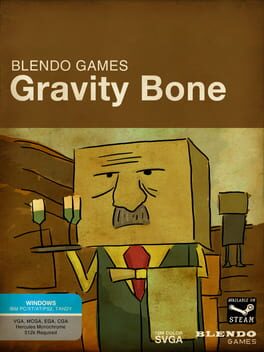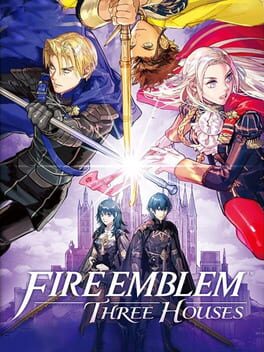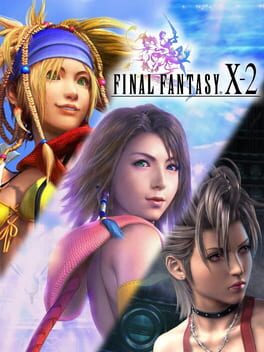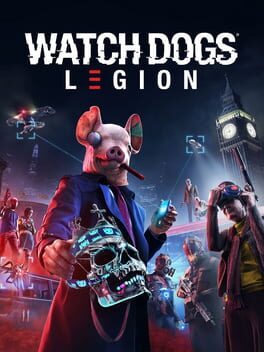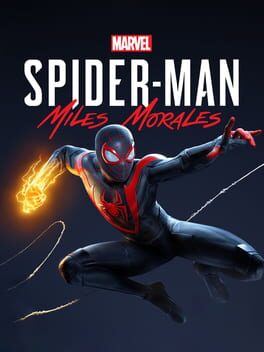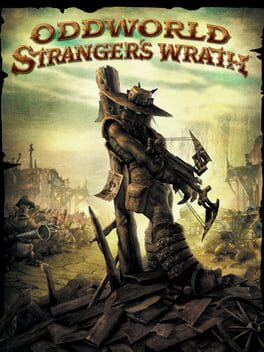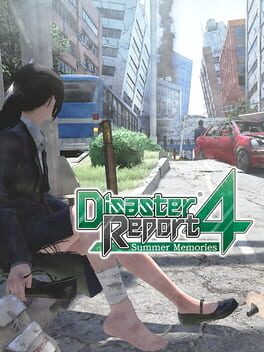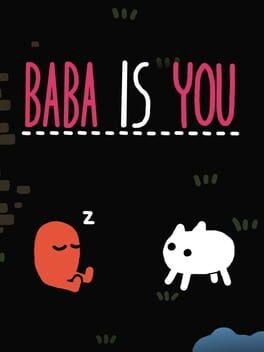37 Reviews liked by Jeandank
Disaster Report
2002
Only got Ending 1
Incredible use of PS2 hardware. Every building collapse felt cataclysmic as the system struggled under the weight of the sliding polys onscreen. Delightful voice acting, charmingly interactive but just distanced enough to avoid goofy territory. Some disarmingly touching moments here (the old couple)
Incredible use of PS2 hardware. Every building collapse felt cataclysmic as the system struggled under the weight of the sliding polys onscreen. Delightful voice acting, charmingly interactive but just distanced enough to avoid goofy territory. Some disarmingly touching moments here (the old couple)
Gravity Bone
2008
Way too toothless an experience in my opinion, and for all it feigns interest in it's characters I was surprised how little actual effect your decisions have on them. While the game tries to argue against the harsh tribalism that defines wartime, it's mechanics betray the opposite: if somebody is on your team they will stay there no matter what you do, even if it makes no sense for their particular character. While I suppose this is meant to provide the player with the feeling of freedom , for me it had a more constrictive effect. I knew I could never make characters hate me or leave my class unless the story dictated it must occur (as it does in the Edelgard route when a very small handful of possible recruits will leave). Maybe this seems unfair but honestly, this is stuff that even a morally unimaginative company like Bioware had figured out in the late 2000's...characters should fight, even if they're on the same team, and the protagonist should actually have to make a stand and not just say whatever they know will make the support ranking go up while knowing that later they'll say the complete opposite. If you're going to make a story about the tragedy of decaying friendships, the characters actually have to have friendships that can decay in the first place.
I can't help but compare this to Genealogy of the Holy War, which of course I'm crazy for. I had characterized the writing in that game as broad but I realize now that it's actually highly efficient. The way the game presents these characters is mostly only seen through the opening cutscenes of a chapter, with the occasional vignette between units sprinkled in (if you spend a turn using the talk command on the battlefield). There is so much less dialogue compared to the hours and hours that can be found in Three Houses, and yet the characters in Genealogy were so much more vibrant to me after only a single playthrough. They felt as if they lived outside of me, that they had moments in their lives that I was not privy to. I could imagine the relationships between them in my head, imagine their downtime between battles as well as their maneuvers during combat. When characters in Genealogy of the Holy War get married, there isn't a cutscene, or even any dialogue. In fact the only thing that clues you in is that now the married units can exchange gold with each other. I felt the connection between these people even if it wasn't actively shown, and because of that the tragedy of their eventual fates hit all the harder. It's a narrative that felt spacious in a way that made me realize how constrictive so many games that present you with "moral dilemmas" actually are.
I'm rambling now so apologies, I'm not a writer. I guess the best way to sum up my feelings is that in Three Houses I felt that I was playing for the story, but in Genealogy I was just...playing the story.
I can't help but compare this to Genealogy of the Holy War, which of course I'm crazy for. I had characterized the writing in that game as broad but I realize now that it's actually highly efficient. The way the game presents these characters is mostly only seen through the opening cutscenes of a chapter, with the occasional vignette between units sprinkled in (if you spend a turn using the talk command on the battlefield). There is so much less dialogue compared to the hours and hours that can be found in Three Houses, and yet the characters in Genealogy were so much more vibrant to me after only a single playthrough. They felt as if they lived outside of me, that they had moments in their lives that I was not privy to. I could imagine the relationships between them in my head, imagine their downtime between battles as well as their maneuvers during combat. When characters in Genealogy of the Holy War get married, there isn't a cutscene, or even any dialogue. In fact the only thing that clues you in is that now the married units can exchange gold with each other. I felt the connection between these people even if it wasn't actively shown, and because of that the tragedy of their eventual fates hit all the harder. It's a narrative that felt spacious in a way that made me realize how constrictive so many games that present you with "moral dilemmas" actually are.
I'm rambling now so apologies, I'm not a writer. I guess the best way to sum up my feelings is that in Three Houses I felt that I was playing for the story, but in Genealogy I was just...playing the story.
Final Fantasy VII
1997
Final Fantasy X-2
2003
This review contains spoilers
Final Fantasy X-2 probably peaks with the opening cinematic, which is fine, because the opening cinematic contains the whole game in it. On the surface, we have Yuna, inexplicably doing a pop concert instead of the normal Yuna stuff (crying) that we’re used to from the previous game. A few minutes later into the game, we learn that it’s not really Yuna but Leblanc, the game’s thin attempt at a Gary Oak-type rival character, who has stolen Yuna’s Garment Grid in order to impersonate her. Much later, we learn that it’s not really Leblanc singing the song, because the Dressphere plugged into the Garment Grid is channeling the consciousness of Lenne, the thousand-year-dead summoner whose tragic love story forms the overplot of the game. Upon a relisten, the lyrics of “Real Emotion,” only a bit less hamhandedly than the later “1000 Words,” are a message from Lenne to her lover Shuyin. So those first two minutes are this very tricky, layered thing, but, as with everything else about X-2 and appropriately for a game primarily about clothes, the depths are all in the surface: the interesting and compelling idea here is Yuna playing a pop concert.
Almost everything about X-2’s story that isn’t directly about Yuna is forgettable if not outright stupid, but what the game does with the character of Yuna is a phenomenal little magic trick. Yuna from the first game is maybe my favorite character in a video game, and we see her for most of that game in a particular mode: she’s spent her life preparing herself to be sacrificed into the maw of the Yevon death-religion, and she walks and talks like her body is an expensive outfit that she is only borrowing and has to return in good condition. X-2 shocks us right away with the kinetic, sexual, effervescent Yuna, whom I’ve been tweeting about under the name of “College Yuna,” and (if you’re anything like me) you spend the whole game chasing that high, wanting to get to know that Yuna, and largely ignoring anything else.
College Yuna works because the seeds of that character are planted by the earlier (much better) game: we’ve already seen Yuna’s sexuality, her hints of vanity, her sense of humor, the way she sticks to and admires her cousin Rikku. X-2 makes the compelling argument that Yuna would semi-authentically bounce back from tragedy and embrace those dormant parts of her personality. Where the worldbuilding of the game works—mostly early on—it’s in the way that Spira mirrors Yuna’s development. I am moved by the game’s depiction of an economic boom, a society that is not utopian but on an upswing, in which people are able to pursue opportunities that weren’t available to them before. I’m tickled by some of the D-plots involving bit characters from the previous game who are sort of caught up on the ennui of choice. I particularly liked Isaaru, one of the more devout Yevonites from the previous game, becoming a petty con artist in the Zanarkand ruins (all the more so, I think, because I fell off that plotline early in the game and never got to his redemption arc, which I’m sure was cloying). This stuff is particularly resonant playing this in the beginning of 2021: Republicans are out of the presidency and Senate and the people I love are starting to get vaccinated against COVID-19. It’s not an Eternal Calm—things are fraying already—but there is a similar sense that death is no longer the dominant presence and the organizing factor of our lives.
The other thing that makes Yuna work so well is Hedy Buress, who gives probably my favorite voice performance in a video game. Most of the grace notes in the annoying parts of this game are line readings that Buress just nails. There’s a pretty awful speech right before the end, a sort of lesser recapitulation of Auron’s big corny-but-effective “this is your story” speech from the previous games, but she preludes it by telling Mevyn Nooj “I don’t like your plan. It sucks!” in a way that hits ten times as hard as anything that follows. In the game’s more serious, tense moments, Yuna falls back into the breathy, halting voice that she used in the previous game, but in lighter moments you can hear her making a physical effort to project herself, a sort of hypomanic bark. You can sense that the happiness she feels is delicate, but authentic, but also that she’s always trying to convince people of its authenticity. (This is particularly true when she’s around her fretful cousin Brother, whose characterization in this some of my friends have decried as a sort of thoughtless gesture towards cousin-incest, but that’s not how I read it. You see these characters in sort of a competition to out-act each other.)
The best line reading in the game happens after the backrub minigame. Yuna, disguised in a rubbery jumpsuit she stole from a henchwoman who was relaxing in a hot spring, sneaks into Leblanc’s headquarters only to learn that she’s accidentally disguised herself as Leblanc’s masseuse, and has to give her a massage before you can sneak off. You, the player, see Leblanc’s back divided into a three-by-three grid, and you pick a point in the grid to rub, and then a color or noise indicator tells you whether you picked the right one. If you do roughly average on this over the course of fifteen attempts, Leblanc falls asleep. “She fell asleep?” asks Yuna, and then looks at her hand in awe and says, “I’m that good?” I cannot express to you how funny and delightful this is in context.
The entire game is full of bullshit like that—arbitrary minigames and little goofy episodes, some of them mandatory, some of them strongly suggested, ohers hidden from view. You get in little shootouts with cactuars, wrangle chocobos, talk to random women to propose marriage on behalf of a merchant’s shameful bachelor son. You watch security cameras and press “Y” when you see a clue. All of this stuff was thrown together cheaply to fill out a game that was made as a budget-saving measure at a time when the studio had bankrupted itself making a supposedly-shitty movie, but, secretly, it makes the game. The sheer weight of goofy little episodes, all of which feel like stories from my college years that were hilarious at the time and impossible to explain now, make the game feel lived-in in a way that the main plot doesn’t.
The core gameplay, to be fair, is exquisite. FFX-1 ditched the active time battle system of previous games for a more strictly turn-based, strategically complex system that forced you to keep all seven characters (well, six of them) in rotation. FFX-2, in keeping with its more kinetic, bodily nature, brings the active time back with a vengeance, pacing it a little faster than any other game I’ve played. The timer only stops when you’re in the middle of one of your Spherechanges, doing a cheeky hard-PG-13 quick-change into an outfit corresponding to a class, and the game incentivizes you to do this often both because the classes provide complementary strategic options and because it slows things the fuck down when they get frantic. I appreciate that this is a game where the random encounters are often harder than the boss fights: it’s easy to get overwhelmed by three of the little wolf enemies, or to run into some massive mech in the middle of Kilika Woods that takes out your whole team in a hit.
But most importantly, the combat expresses character. In X-1, the game is always reminding you that the fiends you fight are the spirits of the dead denied last rights, who litter the roads like weeds as a result of a thousand years of religious purges, Sin attacks, and then, Spira spiralling, fiend attacks. In X-2, although the fiends are the same (God forbid this game should create a new enemy model; even half the bosses are “corrupted” forms of X-1’s aeons, and the final boss just uses all of Tidus’ Overdrive attacks), the context is totally different. The point of every fight in the game is that, as Rikku says in the opening cinematic, it’s showtime, girls: Yuna and her friends are having a great time and showing off for one another. This is the only time when Rikku, who was a lovely character in the first game but doesn’t really have anything to do here, and Paine, who like every other character original to this game is never really compelling, comes alive. The little snippets of dialogue that accompany fights are crucial here. Every time you take down an enemy and all three girls do a pose and go “Gullwings get the goal!” it is a pure dopamine trip.
The dressphere thing is hacked into the storyline by way of the Lenne thing. Lenne inhabits the songstress dressphere, evidently an artifact from Zanarkand, and every time Yuna puts it on, she, in essence, becomes Lenne. There’s an interesting philosophy of fashion here, maybe: I’m not the right person to discuss it because most of my clothes are bought for me personally by a VP-level exec at TJ Maxx / Marshalls (this is true and I’m not elaborating on it for you or anyone). It raises some interesting questions about Yuna’s default outfit—the Gunner—which has the Jecht logo emblazoned in barbed wire across her (lovingly remastered for Switch) breasts. Of course it’s a sexy wedding ring, a big sign that says “look, but don’t touch.” By way of Jecht, it’s also the emblem of Sin, Yuna’s conquered enemy. And it’s just as likely to be an artifact of Zanarkand, belonging to some groupie of the “real” Jecht, whose son may well have been Shuyin, the “real” Tidus. Yuna spends a lot of this game saying that everything is connected but never really follows the concept through. If Tidus is only the Fayth’s dim memory of a person who lived and died during the Machina War, then it’s probably Shuyin, and it follows that Tidus’ feelings for Yuna were only a dim memory of Shuyin’s feelings for Lenne, and those same feelings are what nearly precipitates the end of the world in this game. Yuna’s yearning for Tidus in turn might be a desire for a lost history that’s much uglier than she imagines.
But the game never goes anywhere with these themes, because it’s stupid. (If you want a good story about the creeping revelation that your deepest feelings are really just something that someone may have felt once and the feeling latched onto you completely by accident, that’s what Blade Runner 2049 is about, and that movie—I can’t explain this but I’m right—somehow has less Jared Leto in it than this game). The main plotline of this game simply isn’t good. You can tell that someone early in the dev process decided that X-2 needed its own version of Sin, and they came up with Vegnagun, which is sort of the Mechagodzilla of Sin. But the main characters literally don’t see Vegnagun except in thousand-year-old movies until the very end of the game. In the original game, you feel Sin in every scene, never mind that it actually shows up every five hours or so. Remember in X-1 after Operation Mi’ihen when Tidus suddenly knows that what Auron had told him was true, that the giant death-whale could be nothing else but a thousand-year-magnified incarnation of his father’s rage, and he dives recklessly into the ocean in search of some sort of confrontation? Literally nothing like that happens in this game.
I am maybe being unfair on X-2’s handling of the subject of emotional transference and mirroring. The operating logic of the game is pop music, and pop is driven, it seems to me, by the assumption that feelings are mostly universal and therefore best expressed in simple and universal terms. I’m writing this from the year 2021 when we have grown used to the idea of video games that are also albums, and that’s what X-2 most wants to be, even if it doesn’t know it. There are only two original pop songs, both of which are standout moments of the game, and if they’d thrown in a third one toward the end I would probably be giving the game four stars right now. Instead we get the trio of badly-characterized male characters—Gippal, the Al Bhed faction leader, is so clearly a rejected Kingdom Hearts design that he’s revolting to look at—giving a speech with a bad metaphor about a ship, essentially to the effect that in the name of unity we shouldn’t impeach and convict Donald Trump. (Yuna, too, is a basically a Taylor Swift pop liberal in this, but it’s completely in keeping with her characterization—even several of my friends who are less tepidly socialist than I am and are more readily aggreived by perceived acts of centrism than I agree that, yeah, of course Yuna is a centrist. It’s what it is.) This speech is followed by a fairly cool scene of Yuna surfing the airship, and then cuts to black.
That’s the “Normal Ending,” and it’s the one I got, although for the life of me I can’t figure out why. I specifically Googled everything you needed to do to get the Good Ending, which I thought I was spoiled for: the Fayth reappear, and allow Yuna to see Tidus in the Farplane for just a moment, assuring her that when she finally comes to rest after a long and fruitful life he will be there waiting for her. I like when video games let me cry and I didn’t want to fuck things up for Yuna so I went for the walkthrough, which is against my general principles, and made sure to talk to Maechen in chapter 3 and to whistle in the Farplane. I guess I must have whistled one too few times, because the Fayth didn’t appear. So I pulled up Youtube on the Roku and searched “FFX-2 good ending” and, after fifteen years with the wrong impression, was completely blindsided by the actual good ending, where the Fayth straight-up bring Tidus back to life and there’s an unbelievably hyperbolic scene of everyone cheering while he and Yuna run off to fuck on a beach somewhere. Of course this affected me deeply; I’m still trying to figure out how exactly.
When I started this game I tweeted to the effect that the test was whether this would be one of the long-awaited sequels that instantly asserted for me its canonicity, a la the Deadwood movie or The Dark Knight Strikes Again, or whether it would be a sequel that registered as regrettable fanfic, a la the Buffy comics or The Legend of Korra. After watching the “normal ending,” and before watching the “good ending,” I tweeted a quick reply: “it’s fanfic.” Even within that fanfic, the “good ending” describes something that did not happen: apparently I, somehow, didn’t earn it. That which was lost—one of the most affecting fictional character deaths of my teenage years—remains lost to me. And even if it had happened, even if I were determined to accept the “perfect ending” as the “true ending,” it makes no sense, because the whole story that leads to the Fayth gifting Tidus back to Yuna is such bullshit (Vegnagun!), and because that scene so exactly mirrors the kind of thing that people in movies hallucinate as they’re bleeding out from, say, falling off an airship.
It’s simply not real—not real in the way that it was real when Tidus faded away to begin with. I cannot accept that this is what happened next because there’s too much baggage that I would have to take along with it. It’s not even part of the game, but just something I watched on Youtube. Eerily, this puts me in the exact position that Yuna’s in at the beginning of the game when she sees the sphere of Shuyin. She knows very well that it’s just a video: it’s not Tidus. “It’s just his face,” she says. She saw him fade just the same as I did. But once you’ve seen it, you can’t just dismiss it. The moment you let it into your brain, the idea of a restoration of things lost and a perfect happiness is something that you can’t get rid of.
Almost everything about X-2’s story that isn’t directly about Yuna is forgettable if not outright stupid, but what the game does with the character of Yuna is a phenomenal little magic trick. Yuna from the first game is maybe my favorite character in a video game, and we see her for most of that game in a particular mode: she’s spent her life preparing herself to be sacrificed into the maw of the Yevon death-religion, and she walks and talks like her body is an expensive outfit that she is only borrowing and has to return in good condition. X-2 shocks us right away with the kinetic, sexual, effervescent Yuna, whom I’ve been tweeting about under the name of “College Yuna,” and (if you’re anything like me) you spend the whole game chasing that high, wanting to get to know that Yuna, and largely ignoring anything else.
College Yuna works because the seeds of that character are planted by the earlier (much better) game: we’ve already seen Yuna’s sexuality, her hints of vanity, her sense of humor, the way she sticks to and admires her cousin Rikku. X-2 makes the compelling argument that Yuna would semi-authentically bounce back from tragedy and embrace those dormant parts of her personality. Where the worldbuilding of the game works—mostly early on—it’s in the way that Spira mirrors Yuna’s development. I am moved by the game’s depiction of an economic boom, a society that is not utopian but on an upswing, in which people are able to pursue opportunities that weren’t available to them before. I’m tickled by some of the D-plots involving bit characters from the previous game who are sort of caught up on the ennui of choice. I particularly liked Isaaru, one of the more devout Yevonites from the previous game, becoming a petty con artist in the Zanarkand ruins (all the more so, I think, because I fell off that plotline early in the game and never got to his redemption arc, which I’m sure was cloying). This stuff is particularly resonant playing this in the beginning of 2021: Republicans are out of the presidency and Senate and the people I love are starting to get vaccinated against COVID-19. It’s not an Eternal Calm—things are fraying already—but there is a similar sense that death is no longer the dominant presence and the organizing factor of our lives.
The other thing that makes Yuna work so well is Hedy Buress, who gives probably my favorite voice performance in a video game. Most of the grace notes in the annoying parts of this game are line readings that Buress just nails. There’s a pretty awful speech right before the end, a sort of lesser recapitulation of Auron’s big corny-but-effective “this is your story” speech from the previous games, but she preludes it by telling Mevyn Nooj “I don’t like your plan. It sucks!” in a way that hits ten times as hard as anything that follows. In the game’s more serious, tense moments, Yuna falls back into the breathy, halting voice that she used in the previous game, but in lighter moments you can hear her making a physical effort to project herself, a sort of hypomanic bark. You can sense that the happiness she feels is delicate, but authentic, but also that she’s always trying to convince people of its authenticity. (This is particularly true when she’s around her fretful cousin Brother, whose characterization in this some of my friends have decried as a sort of thoughtless gesture towards cousin-incest, but that’s not how I read it. You see these characters in sort of a competition to out-act each other.)
The best line reading in the game happens after the backrub minigame. Yuna, disguised in a rubbery jumpsuit she stole from a henchwoman who was relaxing in a hot spring, sneaks into Leblanc’s headquarters only to learn that she’s accidentally disguised herself as Leblanc’s masseuse, and has to give her a massage before you can sneak off. You, the player, see Leblanc’s back divided into a three-by-three grid, and you pick a point in the grid to rub, and then a color or noise indicator tells you whether you picked the right one. If you do roughly average on this over the course of fifteen attempts, Leblanc falls asleep. “She fell asleep?” asks Yuna, and then looks at her hand in awe and says, “I’m that good?” I cannot express to you how funny and delightful this is in context.
The entire game is full of bullshit like that—arbitrary minigames and little goofy episodes, some of them mandatory, some of them strongly suggested, ohers hidden from view. You get in little shootouts with cactuars, wrangle chocobos, talk to random women to propose marriage on behalf of a merchant’s shameful bachelor son. You watch security cameras and press “Y” when you see a clue. All of this stuff was thrown together cheaply to fill out a game that was made as a budget-saving measure at a time when the studio had bankrupted itself making a supposedly-shitty movie, but, secretly, it makes the game. The sheer weight of goofy little episodes, all of which feel like stories from my college years that were hilarious at the time and impossible to explain now, make the game feel lived-in in a way that the main plot doesn’t.
The core gameplay, to be fair, is exquisite. FFX-1 ditched the active time battle system of previous games for a more strictly turn-based, strategically complex system that forced you to keep all seven characters (well, six of them) in rotation. FFX-2, in keeping with its more kinetic, bodily nature, brings the active time back with a vengeance, pacing it a little faster than any other game I’ve played. The timer only stops when you’re in the middle of one of your Spherechanges, doing a cheeky hard-PG-13 quick-change into an outfit corresponding to a class, and the game incentivizes you to do this often both because the classes provide complementary strategic options and because it slows things the fuck down when they get frantic. I appreciate that this is a game where the random encounters are often harder than the boss fights: it’s easy to get overwhelmed by three of the little wolf enemies, or to run into some massive mech in the middle of Kilika Woods that takes out your whole team in a hit.
But most importantly, the combat expresses character. In X-1, the game is always reminding you that the fiends you fight are the spirits of the dead denied last rights, who litter the roads like weeds as a result of a thousand years of religious purges, Sin attacks, and then, Spira spiralling, fiend attacks. In X-2, although the fiends are the same (God forbid this game should create a new enemy model; even half the bosses are “corrupted” forms of X-1’s aeons, and the final boss just uses all of Tidus’ Overdrive attacks), the context is totally different. The point of every fight in the game is that, as Rikku says in the opening cinematic, it’s showtime, girls: Yuna and her friends are having a great time and showing off for one another. This is the only time when Rikku, who was a lovely character in the first game but doesn’t really have anything to do here, and Paine, who like every other character original to this game is never really compelling, comes alive. The little snippets of dialogue that accompany fights are crucial here. Every time you take down an enemy and all three girls do a pose and go “Gullwings get the goal!” it is a pure dopamine trip.
The dressphere thing is hacked into the storyline by way of the Lenne thing. Lenne inhabits the songstress dressphere, evidently an artifact from Zanarkand, and every time Yuna puts it on, she, in essence, becomes Lenne. There’s an interesting philosophy of fashion here, maybe: I’m not the right person to discuss it because most of my clothes are bought for me personally by a VP-level exec at TJ Maxx / Marshalls (this is true and I’m not elaborating on it for you or anyone). It raises some interesting questions about Yuna’s default outfit—the Gunner—which has the Jecht logo emblazoned in barbed wire across her (lovingly remastered for Switch) breasts. Of course it’s a sexy wedding ring, a big sign that says “look, but don’t touch.” By way of Jecht, it’s also the emblem of Sin, Yuna’s conquered enemy. And it’s just as likely to be an artifact of Zanarkand, belonging to some groupie of the “real” Jecht, whose son may well have been Shuyin, the “real” Tidus. Yuna spends a lot of this game saying that everything is connected but never really follows the concept through. If Tidus is only the Fayth’s dim memory of a person who lived and died during the Machina War, then it’s probably Shuyin, and it follows that Tidus’ feelings for Yuna were only a dim memory of Shuyin’s feelings for Lenne, and those same feelings are what nearly precipitates the end of the world in this game. Yuna’s yearning for Tidus in turn might be a desire for a lost history that’s much uglier than she imagines.
But the game never goes anywhere with these themes, because it’s stupid. (If you want a good story about the creeping revelation that your deepest feelings are really just something that someone may have felt once and the feeling latched onto you completely by accident, that’s what Blade Runner 2049 is about, and that movie—I can’t explain this but I’m right—somehow has less Jared Leto in it than this game). The main plotline of this game simply isn’t good. You can tell that someone early in the dev process decided that X-2 needed its own version of Sin, and they came up with Vegnagun, which is sort of the Mechagodzilla of Sin. But the main characters literally don’t see Vegnagun except in thousand-year-old movies until the very end of the game. In the original game, you feel Sin in every scene, never mind that it actually shows up every five hours or so. Remember in X-1 after Operation Mi’ihen when Tidus suddenly knows that what Auron had told him was true, that the giant death-whale could be nothing else but a thousand-year-magnified incarnation of his father’s rage, and he dives recklessly into the ocean in search of some sort of confrontation? Literally nothing like that happens in this game.
I am maybe being unfair on X-2’s handling of the subject of emotional transference and mirroring. The operating logic of the game is pop music, and pop is driven, it seems to me, by the assumption that feelings are mostly universal and therefore best expressed in simple and universal terms. I’m writing this from the year 2021 when we have grown used to the idea of video games that are also albums, and that’s what X-2 most wants to be, even if it doesn’t know it. There are only two original pop songs, both of which are standout moments of the game, and if they’d thrown in a third one toward the end I would probably be giving the game four stars right now. Instead we get the trio of badly-characterized male characters—Gippal, the Al Bhed faction leader, is so clearly a rejected Kingdom Hearts design that he’s revolting to look at—giving a speech with a bad metaphor about a ship, essentially to the effect that in the name of unity we shouldn’t impeach and convict Donald Trump. (Yuna, too, is a basically a Taylor Swift pop liberal in this, but it’s completely in keeping with her characterization—even several of my friends who are less tepidly socialist than I am and are more readily aggreived by perceived acts of centrism than I agree that, yeah, of course Yuna is a centrist. It’s what it is.) This speech is followed by a fairly cool scene of Yuna surfing the airship, and then cuts to black.
That’s the “Normal Ending,” and it’s the one I got, although for the life of me I can’t figure out why. I specifically Googled everything you needed to do to get the Good Ending, which I thought I was spoiled for: the Fayth reappear, and allow Yuna to see Tidus in the Farplane for just a moment, assuring her that when she finally comes to rest after a long and fruitful life he will be there waiting for her. I like when video games let me cry and I didn’t want to fuck things up for Yuna so I went for the walkthrough, which is against my general principles, and made sure to talk to Maechen in chapter 3 and to whistle in the Farplane. I guess I must have whistled one too few times, because the Fayth didn’t appear. So I pulled up Youtube on the Roku and searched “FFX-2 good ending” and, after fifteen years with the wrong impression, was completely blindsided by the actual good ending, where the Fayth straight-up bring Tidus back to life and there’s an unbelievably hyperbolic scene of everyone cheering while he and Yuna run off to fuck on a beach somewhere. Of course this affected me deeply; I’m still trying to figure out how exactly.
When I started this game I tweeted to the effect that the test was whether this would be one of the long-awaited sequels that instantly asserted for me its canonicity, a la the Deadwood movie or The Dark Knight Strikes Again, or whether it would be a sequel that registered as regrettable fanfic, a la the Buffy comics or The Legend of Korra. After watching the “normal ending,” and before watching the “good ending,” I tweeted a quick reply: “it’s fanfic.” Even within that fanfic, the “good ending” describes something that did not happen: apparently I, somehow, didn’t earn it. That which was lost—one of the most affecting fictional character deaths of my teenage years—remains lost to me. And even if it had happened, even if I were determined to accept the “perfect ending” as the “true ending,” it makes no sense, because the whole story that leads to the Fayth gifting Tidus back to Yuna is such bullshit (Vegnagun!), and because that scene so exactly mirrors the kind of thing that people in movies hallucinate as they’re bleeding out from, say, falling off an airship.
It’s simply not real—not real in the way that it was real when Tidus faded away to begin with. I cannot accept that this is what happened next because there’s too much baggage that I would have to take along with it. It’s not even part of the game, but just something I watched on Youtube. Eerily, this puts me in the exact position that Yuna’s in at the beginning of the game when she sees the sphere of Shuyin. She knows very well that it’s just a video: it’s not Tidus. “It’s just his face,” she says. She saw him fade just the same as I did. But once you’ve seen it, you can’t just dismiss it. The moment you let it into your brain, the idea of a restoration of things lost and a perfect happiness is something that you can’t get rid of.
Watch Dogs: Legion
2020
profoundly disappointing, coming from someone who really liked the first two games in the series. the "clockwork city" conceit, where every single npc is an individual with their own schedule and relationships is, at first blush, remarkable. but very soon you realize how impenetrable it makes things. since you're only able to play as npcs who you recruit to the cause, you never feel like you're really inhabiting the world. the second you interact with them, they cease to be who they are and instead slot into a tiny handful of prescribed recruitment missions. these mission never have any relation to who these ppl are, their jobs or histories or personalities. they're just boxes that need to be checked to make the npc playable. and whoever you play as has been yanked out of their procedurally generated routine and made to go on missions. but you can't do their jobs when you control them. you can't spend time with their loved ones. when you are controlling them, they cease to exist. they made this massive real-life simulation, but not for us to live in.
bizarrely short for a launch title, but they still manage to cram in plenty of bullshit collectables on the map regardless. the swinging is way better than in the first game, though, if only because the tricks are more complexly animated and more fun to chain together. i wish they hadn't fucked up the spider-verse suit so bad, it literally made me nauseous to play with. this game is fine i guess.
Burnout Paradise
2008
Rivals
2020
Metal Gear Solid
1998
Important, a classic etc. that nonetheless vacillates wildly between being brilliant and infuriating - it’s a bit of a chore to actually play. The top-down perspective makes the actual 3D space irrelevant for large stretches as the radar does the heavy lifting, though there’s still a tendency to get shot from off-screen, and actually aiming at anything is a nightmare. The characters are all quite badly written, vomiting up their backstories and overexplaining every single moment of subtext ad naseum to Snake’s increasingly hilarious bewilderment, leading to exchanges like: “I’m feeling sad.” “Sad?” “Yes, sad. It’s when the endorphins in your brain don’t fire enough, leading to a lack of energy and motivation.” “I didn’t know your brain controlled your feelings...”
But something that still felt fresh was the Codec, where every one of your contacts says something different every time you walk into a different room, or do something notable - e.g. equipping the cigarettes to get scolded, or repeatedly ringing one until they ignore you. There’s a conscious effort to erase the barrier between gameplay and “story”, which is usually treated as a separate, isolated quality in video game criticism instead of inherent to game-feel. I was impressed with the torture sequence - not only is failure here an option, but it’s the more interesting one, undermining the pastiche of Hollywood action heroics and paying off with a suitably down climactic beat. And while I wasn’t always impressed with the boss fights (especially the gimmicky Psycho Mantis) there’s an admirable sense of experimentation in making them all different. The pacing and build-up to each works well, and there’s some effort to complicate our relationship to them as “enemies”, e.g. Grey Wolf embracing pain. (My favourite was Vulcan Raven and his mini gun, which plays to all the strengths of the stealth gameplay.)
Admirably anti-war in its sentiments, also pretentious, sexist, and with laughable stabs at pathos - though this is, as far as I can tell, Hideo Kojima’s whole deal. Auteurism sometimes demands you take the rough with the smooth.
But something that still felt fresh was the Codec, where every one of your contacts says something different every time you walk into a different room, or do something notable - e.g. equipping the cigarettes to get scolded, or repeatedly ringing one until they ignore you. There’s a conscious effort to erase the barrier between gameplay and “story”, which is usually treated as a separate, isolated quality in video game criticism instead of inherent to game-feel. I was impressed with the torture sequence - not only is failure here an option, but it’s the more interesting one, undermining the pastiche of Hollywood action heroics and paying off with a suitably down climactic beat. And while I wasn’t always impressed with the boss fights (especially the gimmicky Psycho Mantis) there’s an admirable sense of experimentation in making them all different. The pacing and build-up to each works well, and there’s some effort to complicate our relationship to them as “enemies”, e.g. Grey Wolf embracing pain. (My favourite was Vulcan Raven and his mini gun, which plays to all the strengths of the stealth gameplay.)
Admirably anti-war in its sentiments, also pretentious, sexist, and with laughable stabs at pathos - though this is, as far as I can tell, Hideo Kojima’s whole deal. Auteurism sometimes demands you take the rough with the smooth.
A fun, imaginative Western pastiche with an explicit focus on capitalism that eventually morphs into something deeper - one that really acknowledges the racial and historical weight of its American iconography. The other Oddworld games tackle this too, but they're logy where this is three-dimensional, free, and exciting. By default, one of the best games about the transgender experience.
Absolutely not as good as DR2/Raw Danger. I am certain this is quickly cobbled together from whatever was left of the PS3 version pre-cancellation. Systems have no function. Storylines just sort of happen with no consequence or clever tying together (like earlier titles).
What it is exceptionally good at is writing flavorful dialogue for choices that don't really matter, which makes it feel like you are developing some form of character yourself.
What it is exceptionally good at is writing flavorful dialogue for choices that don't really matter, which makes it feel like you are developing some form of character yourself.
Super Mario Odyssey
2017
Here's a little part of the game that I think illustrates both it's strengths and weaknesses.
In the main track of the game, you get to fight a dragon in this weird medieval world and it's super cool and unexpected and the fight is really fun. In the postgame you can go back to that area, but the dragon sort of just sits around. Tells you he's tired. You can't do anything with him. But you can kick a rock into a second rock and get a moon.
In the main track of the game, you get to fight a dragon in this weird medieval world and it's super cool and unexpected and the fight is really fun. In the postgame you can go back to that area, but the dragon sort of just sits around. Tells you he's tired. You can't do anything with him. But you can kick a rock into a second rock and get a moon.

